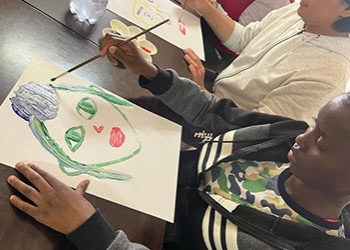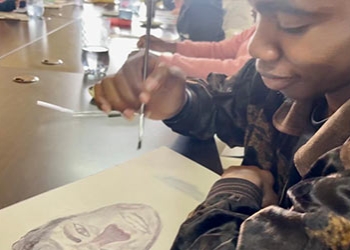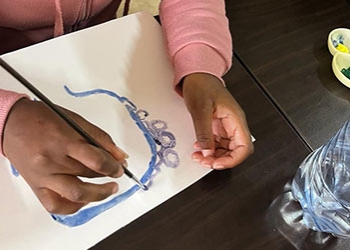Wittenborg Lecturer Delivers 2-Day Education Workshop in Eswatini
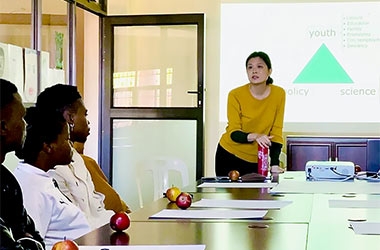
Education in Southern Africa
While most people were celebrating New Year, Dr Cha-Hsuan Liu, associate professor at Wittenborg University of Applied Sciences, had boarded a plane heading to Southern Africa. Her destination was Eswatini – formerly known as Swaziland – a country of 1.2 million people bordering South Africa and Mozambique. "My father works at a hybrid charity centre of childcare and education in Eswatini. It was very logical to me to contribute to the local community during my visit with him," Cha-Hsuan says.
Cha-Hsuan consulted the care centre about what kind of support they sought for before her journey. “My offer must meet the needs of the locals. Most of the time, we have our own idea of the local situation, and the efforts made with good intentions mismatch the demands."
As a scholar who is experienced in teaching critical perspectives in education, healthcare for diversity, youth study and strategic management and leadership, she pitched the idea of potential seminars to the centre. "They quickly replied and asked me to plan an on-site training programme for the volunteer teachers and care providers. We believe the knowledge about children's development and the refreshment of education methods will equip the teachers to manage various occasions regarding children's daily life and education."
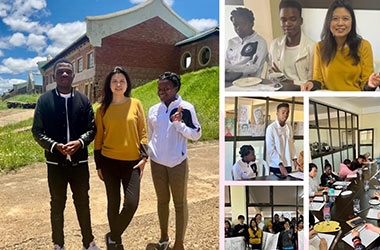
The art of being creative and critical
Responding to the request, Dr Cha-Hsuan Liu designed a two-day workshop. It facilitates educators and caretakers to apply "creation and recreation" as a medium to connect with children, understand their emotions and assist their development. "Fifteen teachers and caretakers attended this workshop. On the first day, we worked on art creativities individually and in groups before introducing theories about art in education or care. It is important for the participants to gain first-hand experience in the activities themselves."
Participants in the workshop were encouraged to create self-portraits with no limits. A teacher put paints on his face and "printed" his face on paper. Cha-Hsuan talked about the workshop with a big smile, "Another teacher drew a stone with his face on it and some bamboo behind. He said I'm a person as tranquil as a rock." With these experiences, it made better sense how art and creativity can relate to emotions, self-esteem and self-understanding.
On the second day, Cha-Hsuan introduced theoretical concepts about critical perspectives in education and led the participants to practise interactive classroom skills. The aim was to assist the educators and caretakers to design courses/activities based on the children’s needs. She also encouraged them to exchange experiences about the work challenges and share creative ideas on the solutions.
This workshop helped volunteers to understand what active learning and interactive education are; Cha-Hsuan calls that an opportunity to reflect upon our own teaching habits. "Most participants hold a traditional education mindset – teachers have the authority in the classroom and the students must sit and listen. Educators who are equipped with the competence and skills to design and implement interactive courses, in fact, can motivate students' active learning."
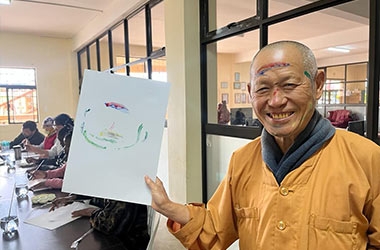
Building a communication bridge
The visit to Eswatini was not Cha-Hsuan's first experience in Africa. She was in Tanzania for the Conference Africa-Asia Axis in 2019 and visited Kenya last year in spring. "When receiving calls for humanitarian support, I try my best to make time for the journey as an impulsive traveller," she explains. "Travelling is meant to connect and communicate with the world." She believes that listening to the local community is the best way to understand needs and provide the necessary support.
During her earlier trip to Kenya, she participated in a volunteer training program in Kibera, one of the largest slums in the world. "I am grateful. The local NGO Afrika Spurs shared their insights and cultural values regarding children's care and education support. They helped me to understand the history of the region and communication skills with the children in need and their families. I have better ideas about the cooperation between stakeholders and advocacy attitude with governments from the local aspect." Cha-Hsuan considers cultural competence as one of the essential elements for successful international cooperation and works in a multicultural setting.
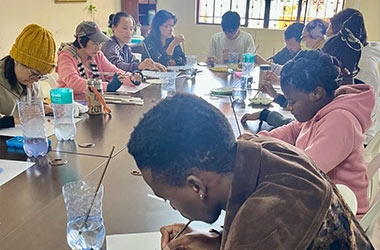
Not only data, but life
Dr Cha-Hsuan Liu appreciates her journeys, which enrich her understanding of people and improves her profession. "In academia, we often forget that our research target is not only data but life." Being an Asian in Europe who frequently travels across borders, Cha-Hsuan feels confident to assist students from all over the world. "We have many African and Asian students in Wittenborg. My travel experience definitely helps me interact with them in greater depth."
WUP 07/05/2023
by Arezoo Rostamzad
©WUAS Press
